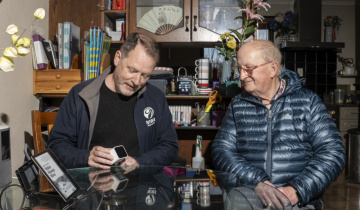If it wasn't for a damaged shoulder, Wills Dobson wouldn't be launching weather balloons. Or fixing high-precision atmospheric measuring instruments. Or living in a small town where sometimes it feels like everyone is more than 20 years older than you.
The shoulder changed everything. He was well on his way to becoming a pilot in the Air Force but just before the final physical test at the end of his officer’s training he damaged his rotator cuff.
“I couldn’t take the test. It was brutal but that’s the way things go.”
An enforced period of reflection, and some work in his original career choice as an outdoors instructor, led him to realise he wanted to learn more about what made the world tick. University seemed the next obvious step.
Wills chose Canterbury because it offered him the opportunity to combine physics, astronomy and Antarctic studies – and the chance to head to Scott Base during some post-graduate study. It got under his skin and he’s been back to the ice every year since. This September will see him there again, taking on the responsibility of training two new science technicians to operate the atmospheric instruments NIWA has installed at Arrival Heights, Antarctica.
Lauder atmospheric research station
At just 29, Wills Dobson's forging a scientific career of international importance. He is now an atmospheric technician at NIWA’s Lauder atmospheric research station. If not the most bustling or glamorous of work places, it is stunningly beautiful. Nestled under the Dunstan Range 35km from Alexandra in Central Otago, the station comprises a single storey office block which is overlooked by several purpose-built buildings dotted across a ridge line, each housing a world-class scientific instrument.
These instruments measure trace gases and chemical compounds in the atmosphere. Wills’ favourite coincidentally bears his name. It is the Dobson spectrophotometer and it measures ozone in the stratosphere. Wills’ job is to record the measurements it makes and make sure it keeps on making them.
He takes measurements from the Dobson twice a day and performs calibrations on several instruments either weekly or monthly to ensure they are operating correctly.
“The idea is that you run a known value through your instrument that will give you known readings you can compare to what is being measured. If the readings are different to what you expect, something’s wrong.”
“We pride ourselves on having really good quality long-term data series. They’re world renowned."
Any slight human alteration to these high precision instruments is recorded in case it affects the measurements.
“You can’t just go out there and do anything you like because we’ve got a really long-term data series, and if that affects the measurements or puts a step in our data then that’s not good. We pride ourselves on having really good quality long-term data series. They’re world renowned.”
Occasionally things don’t go to plan and they break. Then it’s up to Wills to fix them.
“Sometimes it might just mean a piece of tape in the right place to get it going.
“Sometimes it means figuring out what you did when you were tired or what the last operator did by mistake, and just changing one or two settings.
“But sometimes things really go wrong and then it’s a process of elimination.”
Figuring out what the problem is, is about 95 per cent of fixing it.
“You go through your instrument, you work out what has failed and why, and do a whole bunch of different tests you often have to make up on the spot to isolate the problem, and then figure out how to fix it.”
Help close at hand
Despite Lauder’s isolation, there is help close at hand. There is a lot of on-site experience and, beyond that, people doing similar work at similar stations around the world.
“I ask if they’ve ever had this problem before and sometimes they can tell you straight away what to do to fix it. Other times they haven’t had the problem, but are keen to know the outcome because they don’t want it to happen to them.”
The weather balloons take Wills away from the machines. They are launched weekly and carry an ozone sonde to measure ozone as it goes up through the atmosphere, transmitting the data back as it goes. The sondes start being prepared two weeks ahead of launch date and while they are ideally released on a clear, sunny day, it is a rare week when the weather doesn’t co-operate.
“...I’m under no illusion about how lucky I was to get this job."
“It can get difficult in spring because the wind tends to pick up about 9.30am or 10am. Then it’s all hands on deck first thing in the morning to get one away.”
Living in Alexandra
Wills lives in Alexandra. He says small town life has taken some adjusting but he has it well worked out now.
“Most people here tend to be 50-plus, and a large part of that 65-plus. They’re a good bunch of people but not who I’d normally go out on the town with.
“For a while I had a fairly transient group of friends. I knew a lot of backpackers, and of course they’d be here for a few months and then go on somewhere else. The plus side is I have lots of places I can stay in Germany.”
But gradually a core of younger people has shifted to town and there are dinner nights, pub quizzes, skiing and tramping to be getting on with outside work.
“Alex is a pretty chilled place to live. It was pretty hard to acclimatise at first but I’m under no illusion about how lucky I was to get this job.”
The team atmosphere at Lauder is definitely a selling point and his workmates appreciate his organisational skills and improvements he’s made to their systems. He’s also their number one Lauder tour guide.
Wills says with only eight full-time staff, a couple of emeritus researchers and the odd student on site, you can spend large amounts of time not seeing anyone else.
Except for the legendary Lauder morning and afternoon teas. “If it wasn’t for them, we’d hardly ever see each other because everyone does their own thing. All group discussions happen then – sometimes they can get pretty heated and passionate but they are always constructive.
“We’re all a little bit crazy out here in one way or another.”
[This feature appeared in Water & Atmosphere 19]








